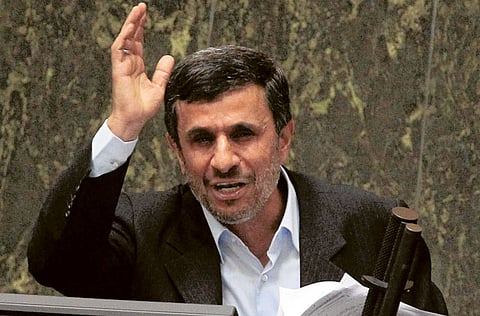Arabs have to speak with one voice
Governments must make use of new opportunities and hope to make up for those that have been lost

When the exchange of threats between the US and Iran decreased, the price of oil stopped increasing, as the Strait of Hormuz became safe.
Military manoeuvres carried out by both sides, in an attempt to flex their muscles, also stopped, thus further ensuring the Strait's safety.
Although this is to the benefit of international security and stability — and is also in the interest of the Arab Gulf region — the interests of both US President Barack Obama and Iranian President Mahmoud Ahmadinejad were paramount on this issue. And led to the situation finally calming down.
Both presidents were facing elections, and both know that international stability is key to their economies.
In the US, the economy is the basic element that will increase Obama's popularity and secure him another four years in the White House; it is also the most important factor in Iran that will determine whether the conservatives will continue to dominate the political scene there.
Hence, the decision to bring about a truce between the two parties was made to give the two presidents a chance to win in their respective countries' elections. After that, the political game will resume.
On such occasions calculations change, and everyone gets a chance to win. But politicians who make precise calculations and take advantage of every available opportunity tend to win. Losers, on the other hand, do not fully appreciate a given prospect.
There are many exceptions to the laws of the political game, where personal interests prevail and the decisions of a political administration — temporarily — benefit a party or a president. Hence all the leaders of the Zionist entity were present in the US recently, and used all their influence on the US administration to guarantee Israel's security. Iran in general and its nuclear programme in particular came second in discussions.
The Zionist presence in the US was not solely because of Iran. It was evident in the speeches of both US and Zionist leaders that the Arab Spring was prominent in their private discussions.
The hot issue of the new parties in countries such as Egypt, Tunisia, Libya, and Morocco was also discussed as both the US and the Zionists are alarmed about the ongoing events there, despite their efforts to influence decisions taken in those countries. And, the Syrian crisis was not absent from the agenda.
As usual Arab politicians did not make use of the available opportunities, and left the Zionist entity to play its games in the White House. US presidential candidates were also keen on showing their solidarity with Israel, guaranteeing its safety and security, and their continual financial support and weapons supplies to Israel.
Zionist arrogance
In these fields, the Zionist lobby imposes its conditions on all the important players in the US. The Arabs, on the other hand, are divided amongst themselves and busy in their meetings with the Russian or Chinese UN envoys to send aid to the Syrian people.
Arabs are also engrossed in discussions with the Iraqi government regarding the Arab Summit — whether to hold it in Baghdad or not — while the Zionists display their arrogance in Gaza and the rest of Palestine.
The Israelis have been given the green light by the US to act as they please in Palestine, on the condition that they desist from any action against Iran, temporarily, as waging a war against Iran at this time will negatively effect Obama and US interests. People may think that Arabs have played all their cards and no longer have anything to bargain with, or that they are useless politically and administratively. However, there are many available opportunities currently, as these are exceptional times. The way of approaching the US is not by giving in to all that it wants, pressurising it or depriving it of some of what it wants. The way to approach the US today is to do the opposite of what it wants.
Arab governments will not be able to retain their pride unless they speak with one voice, make peace with their people, and make decisions that are beneficial to them.
It is important at this stage to work jointly with brothers, to approach friends, and to neutralise opponents — temporarily — to face enemies.The future will not be drawn by the US and the Zionist enemy as they please in a world with a changing geopolitical map.
The features of these changes were evident when the Syrian issue was being discussed at the UN Security Council recently.
Arabs must re-read history lessons as a prelude to a new Obama era, and the rejuvenated, reformist Iranian era, after the old reformists' glow withered away.
Political pioneers — whom we considered to be our enemies until recently — have also entered the Arab arena. Arab regimes have to make use of coming opportunities, and hope to make up for those that have been lost.
Dr Khalifa Rashid Al Sha'ali is an Emirati writer who specialises in legal affairs.



